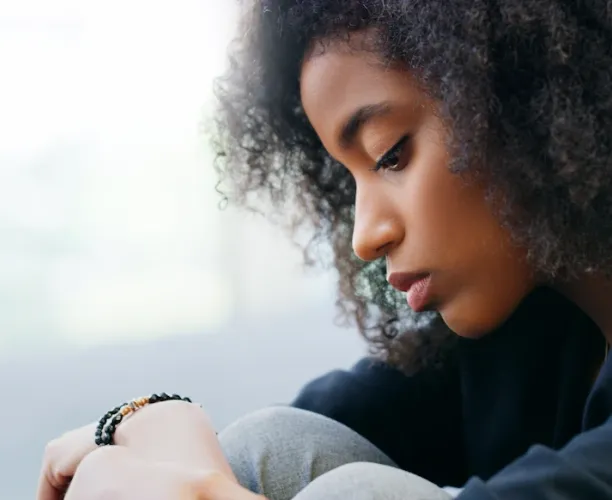

Data Dive: Gen Z women are struggling the most with stress, mental health issues
Life is hard.
And our recent global polling finds Generation Z women* are finding it quite difficult to cope these days.
“I’m not particularly surprised to see that young women show lower levels of mental wellbeing as this is a consistent theme in research that we have been conducting over the past number of years,” says Kieran O’Leary, Director of Public Affairs for Ipsos in Ireland.
Helio Gastaldi, Director of Public Affairs for Ipsos in Brazil, concurs, noting that it’s been a pretty rough few years for young men and women. “During the pandemic young Brazilians were hit hardest by mental health issues due to the imposed social isolation, the impossibility of attending face-to-face classes and the drastic reduction in employment and work possibilities, which brought greater pressure in an already very sensitive phase in people’s lives.”
Plus, young women are facing a whole extra cluster of threats and pressures, says Lucy Neiland, Research Director of Ethnography for Ipsos in the U.K. For example, globally one in three women experience physical or sexual violence from an intimate partner, or sexual violence from a non-partner, across their lifetime, according to the World Health Organization.
Perhaps Gen Z women are particularly frustrated with this grim state of affairs as demonstrated via the high turnout at the marches in response to the killing of Giulia Cecchettin, a 22-year-old biomedical engineering student in Italy, Neiland says.
Also, against the backdrop of austerity and the rise in the cost of living in many countries, there seems to be a movement to double down on more ‘traditional’ gender roles, she says.
“What we are hearing is the view that women have got their slice of the pie and now they’re encroaching into the men’s share — things have ‘gone too far.’ So, there is a backlash — perhaps because this is an easier narrative than unpicking the social/political structures and rigid gender roles that have got us here. What perhaps seems unfair to Gen Z girls and women is the assumption they have a piece of the pie at all.”
Given all of these factors it makes sense that so many young women are hurting so much.
Plus, everything from the coronavirus crisis to the invasion of Ukraine to climate change to inflation has put people of all ages and life stages on edge. Below, we dive deeper into how everyone, from Gen Zers to Baby Boomers, is holding up in these tumultuous times.
On the brighter side, while Gen Z and Millennial women are currently finding things difficult, our polling shows the proportion of women dealing with serious depression appears to trend downwards with age.
“Women are more attentive and more concerned about health issues in general than the male population,” says Gastaldi. But, even given the caveat that women may feel more comfortable talking about and admitting they’re having a tough time, young women are the most likely demographic in Brazil to report struggling, with almost three in five (58%) Brazilian Gen Z women and close to half (48%) of Brazilian Gen Z men reporting being severely depressed to the point they felt sad/hopeless almost every day for a couple of weeks or more.
On the brighter side, while Gen Z and Millennial women are currently finding things difficult, our polling shows the proportion of women dealing with serious depression appears to trend downwards with age.
“Women are more attentive and more concerned about health issues in general than the male population,” says Gastaldi. But, even given the caveat that women may feel more comfortable talking about and admitting they’re having a tough time, young women are the most likely demographic in Brazil to report struggling, with almost three in five (58%) Brazilian Gen Z women and close to half (48%) of Brazilian Gen Z men reporting being severely depressed to the point they felt sad/hopeless almost every day for a couple of weeks or more.
- Age of Anxiety
Living through such a topsy-turvy era predictably has many seriously struggling, particularly those trying to navigate early adulthood.This lines up with what O’Leary is seeing in Ireland, where 58% of Gen Z females and 40% of Gen Z males said they feel so stressed they felt like they couldn’t cope.
“Our ongoing Healthy Ireland Survey measures mental wellbeing and finds that young women are almost twice as likely to indicate having a probable mental health problem when compared to the population as a whole,” he says.
“This is likely reflective of the broader pressures on this cohort today, with many leaving education facing into an uncertain economy and with societal problems such as housing unaffordability impacting them more severely than other groups.”
Ipsos polling around the world finds this is an issue far beyond Ireland, with Gen Z women, on average across 31 countries, the most likely demographic to report feeling so stressed that they felt like they couldn’t cope/deal with things.
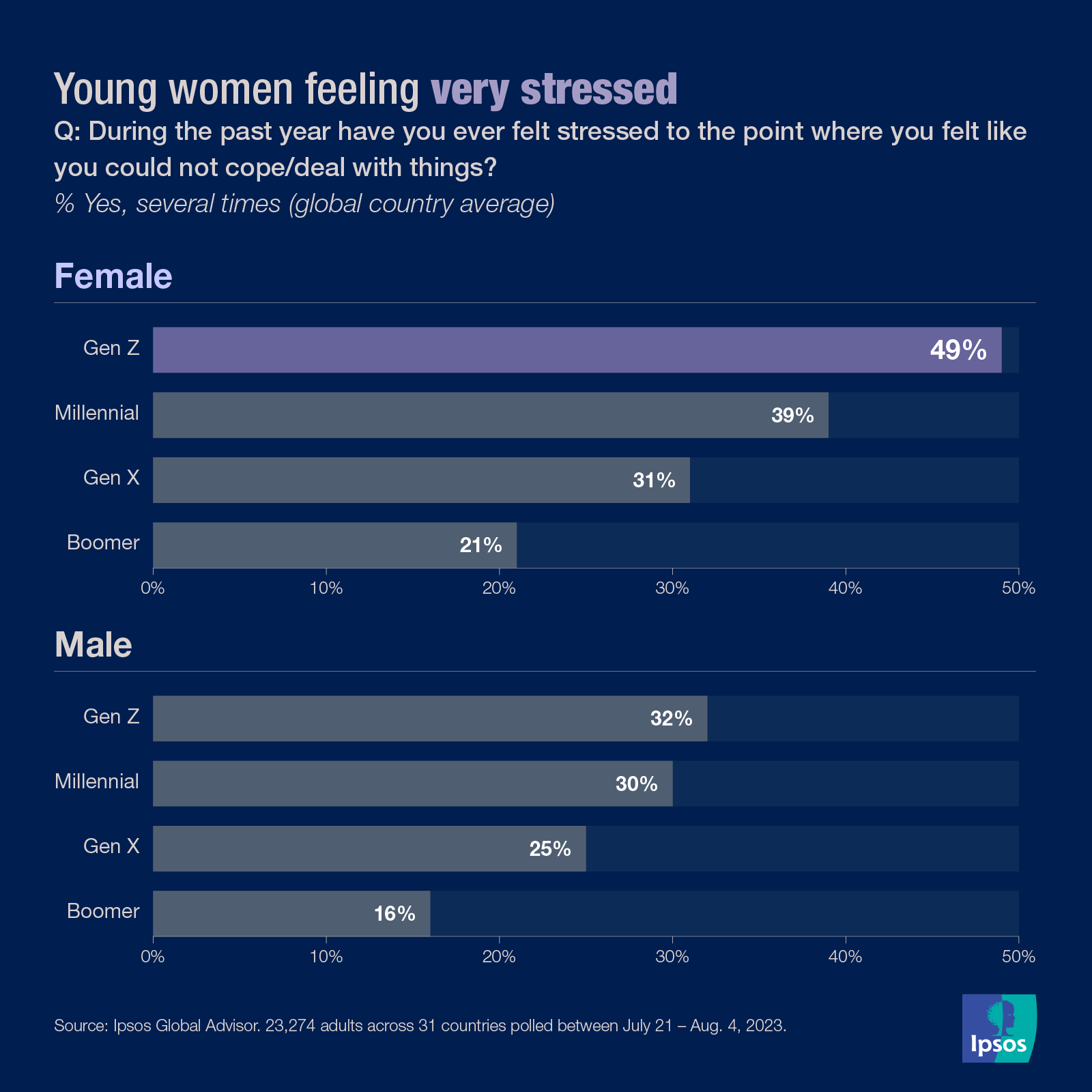
- Taking time off for self-care
Since Gen Z and Millennial women are the most likely to report struggling with their mental wellbeing it makes sense they’re also the most likely demographics to report having felt stressed to the point that they couldn’t go to work for a period of time.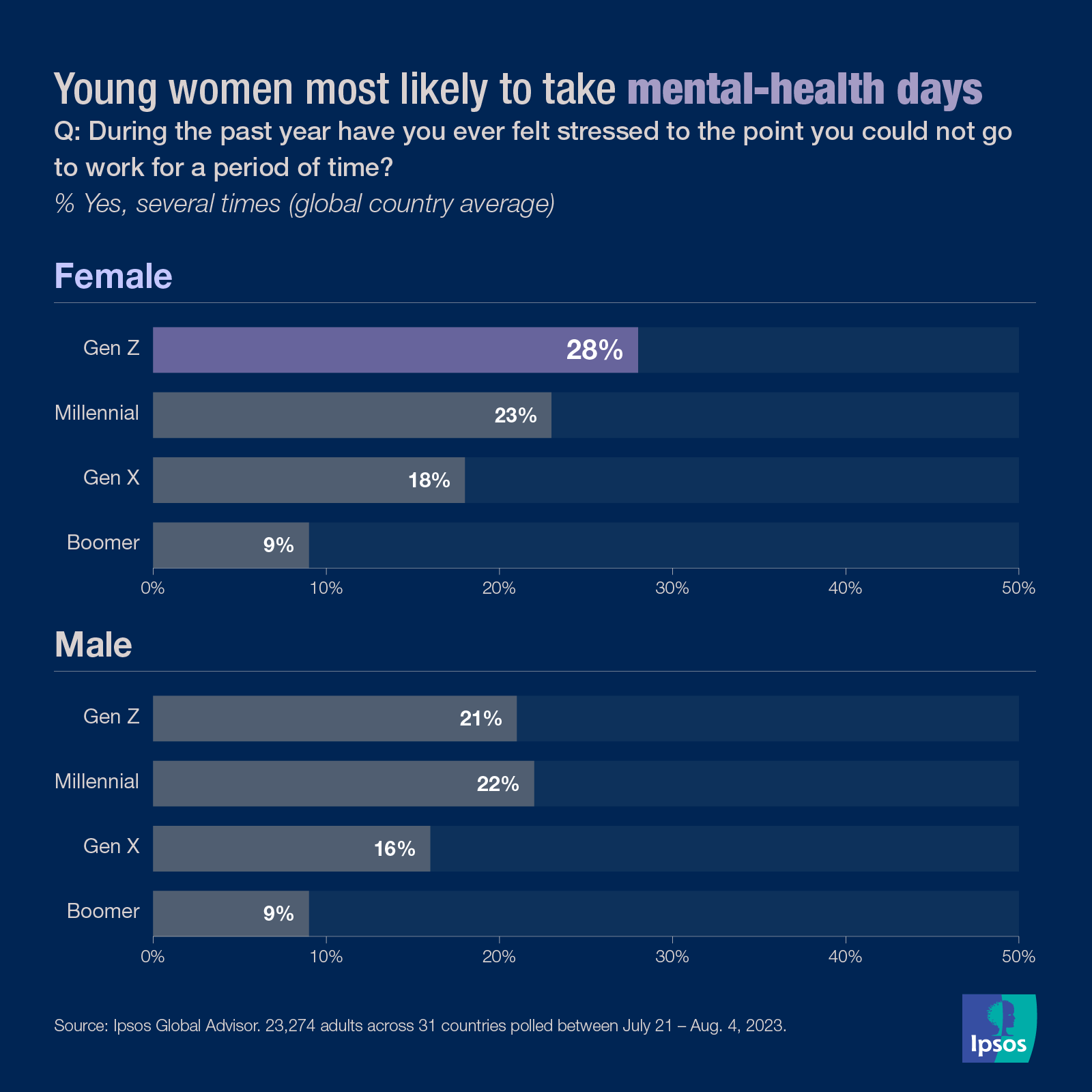
- Feeling bleak
While there’s been a lot of attention in recent years on Gen Z men having a hard time succeeding at school and work, our polling finds Gen Z women, on average globally, are the most likely demographic to report being depressed to the point they felt sad/hopeless almost every day for a couple of weeks or more.On the brighter side, while Gen Z and Millennial women are currently finding things difficult, our polling shows the proportion of women dealing with serious depression appears to trend downwards with age.
“Women are more attentive and more concerned about health issues in general than the male population,” says Gastaldi. But, even given the caveat that women may feel more comfortable talking about and admitting they’re having a tough time, young women are the most likely demographic in Brazil to report struggling, with almost three in five (58%) Brazilian Gen Z women and close to half (48%) of Brazilian Gen Z men reporting being severely depressed to the point they felt sad/hopeless almost every day for a couple of weeks or more.
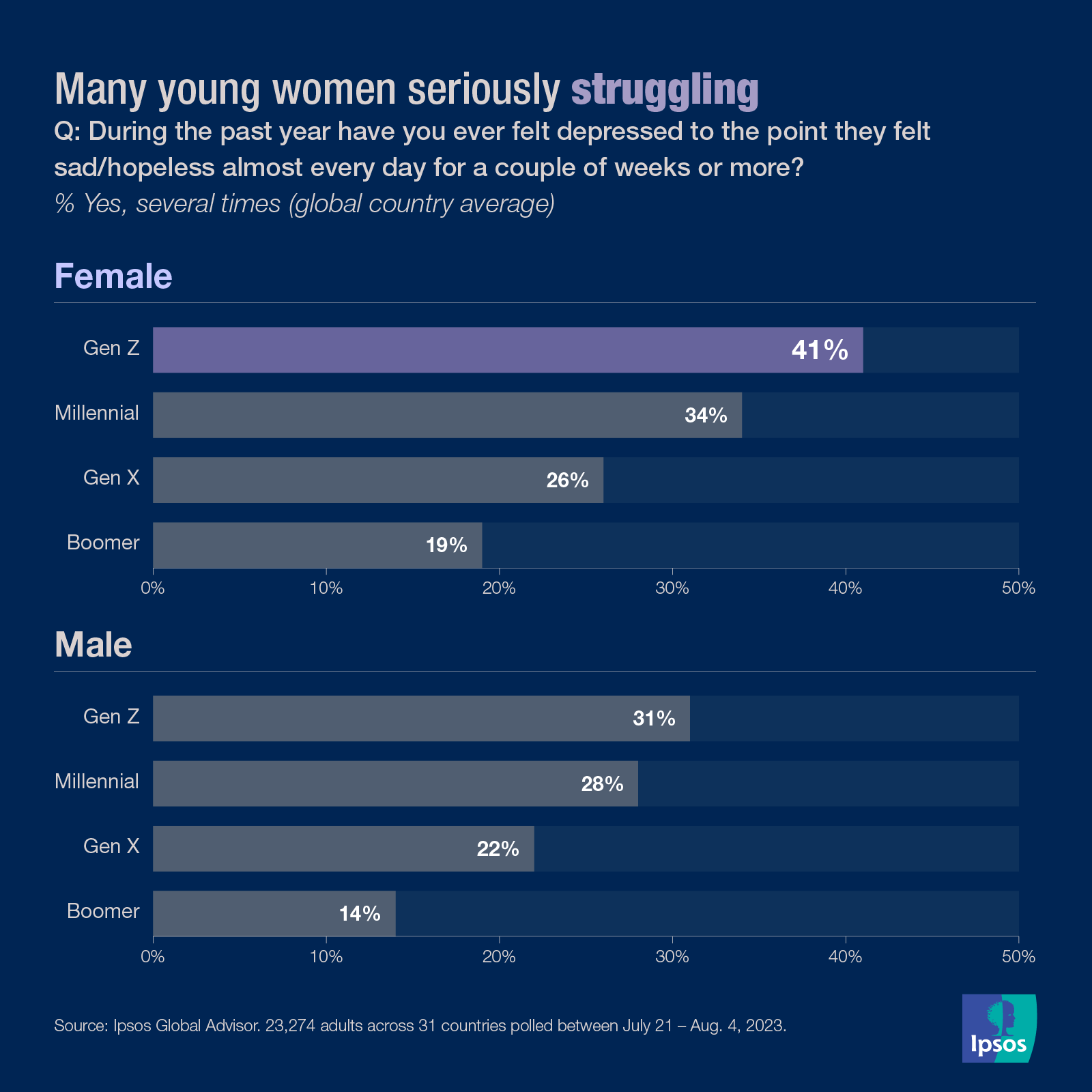
- Dark thoughts
Given that Gen Z women say they’re dealing with mental health issues the most, it’s unfortunately unsurprising they’re the most likely demographic to report having seriously considered self-hurt or suicide several times.While it can be difficult for someone in the depths of darkness to believe things will eventually get better our polling finds the proportion of women reporting thoughts of self-hurt/suicide is much lower among Generation Xers and Boomers.
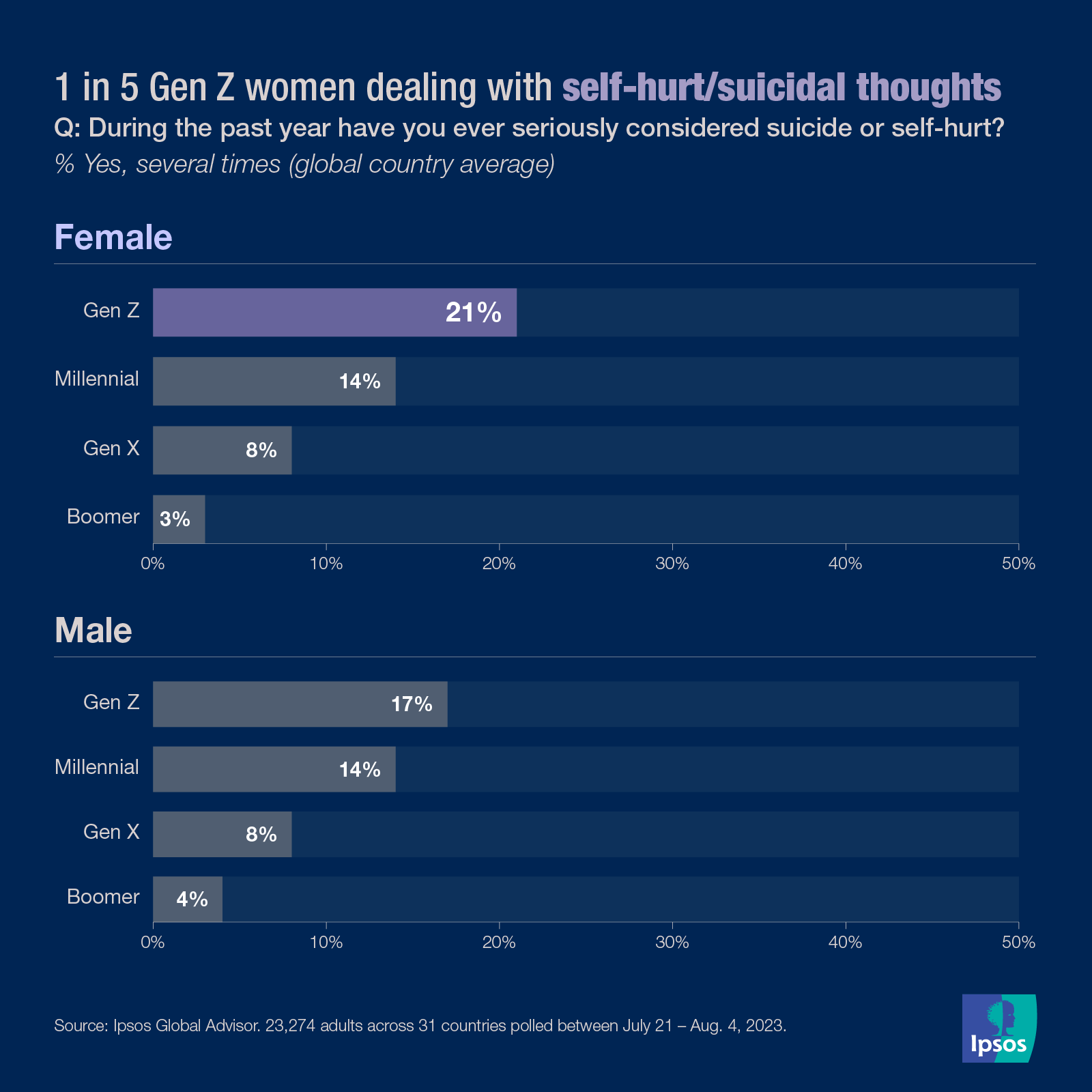
- Mental health is health
It’s clear from our polling that lots of us are capital “S” stressed.And that’s reflected in our polling this year, with Ipsos’ 2023 Global Health Monitor finding mental health is now considered the top health concern, on average across 31 countries, followed by cancer then stress.
People around the world now seem to consider both physical and emotional wellbeing to be key to overall health. That’s a shift Gastaldi’s seen happen in Brazil, where 52% of people think mental health is a top health concern for their country (eight percentage points higher than the global average of 44%).
The onset of the global pandemic in early 2020 led to a “growing interest in Brazilian society in discussing mental health more openly, with the support of experts and personalities in general. This has greatly contributed to a process of demystification of the topic, which historically was treated in a very discreet, and even prejudiced, manner.
“Although there is still a stigma attached to this topic in society, we can now see fewer delays in diagnoses and more appropriate application of treatments.”
While there’s consensus across the generations in Brazil and beyond that being of sound mind and body is equally important, many say healthcare providers don’t seem to also hold that view.
Just over two in three (68% on average globally) Gen Zers say mental health and physical health are equally important, followed by 73% of Millennials, 82% of Gen Xers and 87% of Boomers. Yet, only 35% think healthcare providers are placing equal emphasis on mental and physical health – with Gen Z women the least likely to think both are being treated equally.
While there’s been strides in more openly talking about mental health, even in 2023 young women may still be facing old-fashioned prejudices.
Neiland points out women from all generations have long faced significant barriers, stigma and discrimination when seeking care for both physical and mental health concerns.
“In the hysterical health work we did one can see this long legacy of dismissing women is still there.”
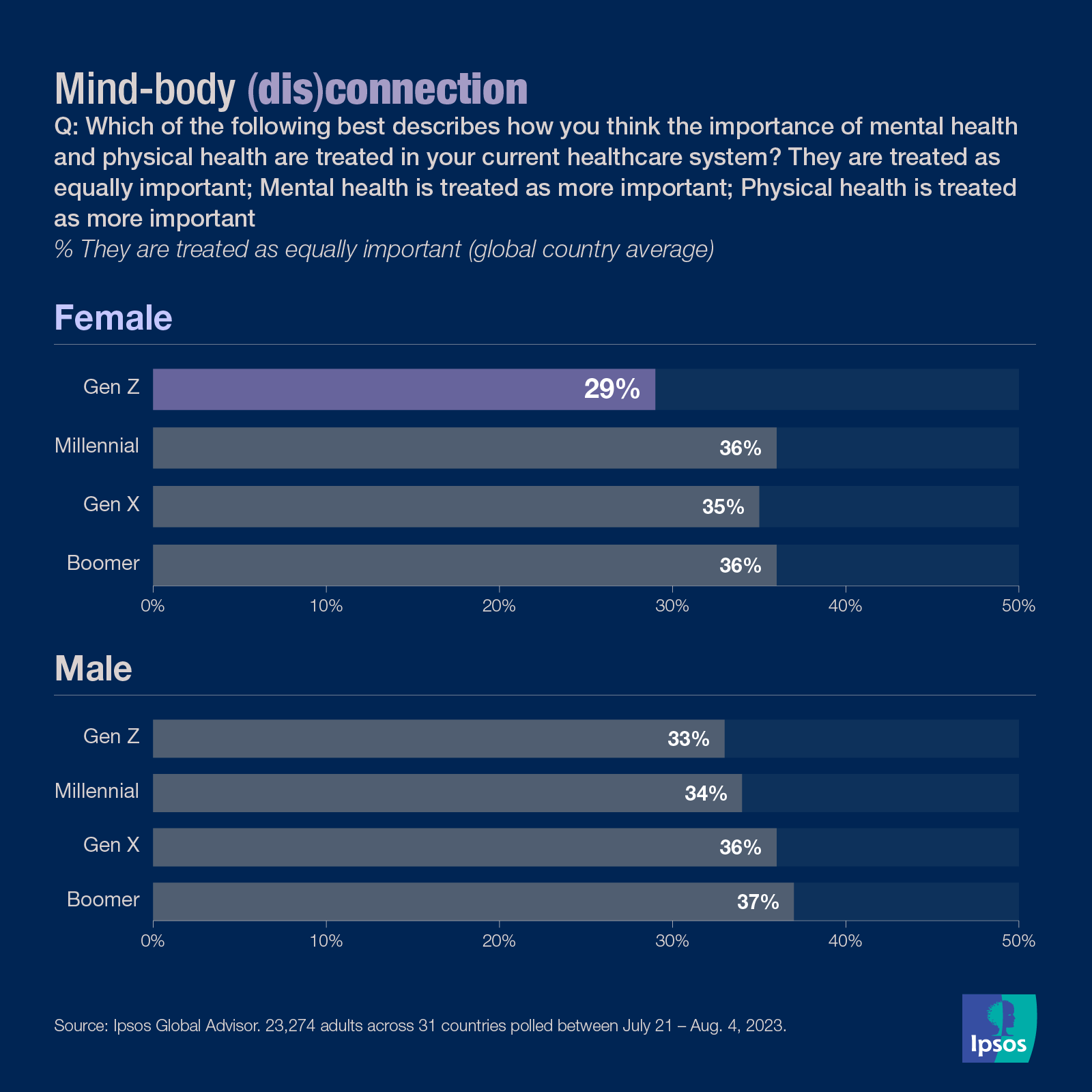
*Generation Z (born between 1996-2012), Millennials (born between 1980-1995), Generation X (born between 1966-1979) and Baby Boomers (born between 1945-1965.
About the study
These are the results of a 31-country survey conducted by Ipsos on its Global Advisor online platform and, in India, on its IndiaBus platform, between Friday, July 21 and Friday, August 4, 2023. For this survey, Ipsos interviewed a total of 23,274 adults aged 18 years and older in India, 18-74 in Canada, Republic of Ireland, Malaysia, New Zealand, South Africa, Turkey, and the United States, 20-74 in Thailand, 21-74 in Indonesia and Singapore, and 16-74 in all other countries.



